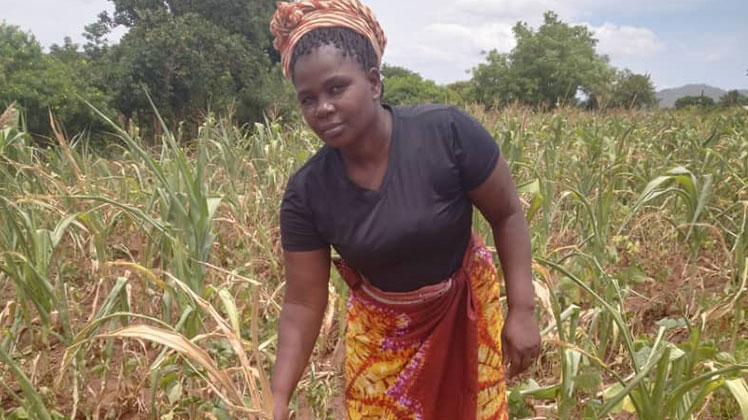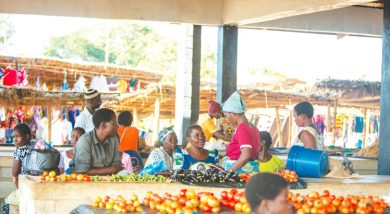Dry spell doom
The sustained dry spell which has persisted since mid-January in some parts of the country is beginning to worry some farmers, putting them under panic.
Spot-checks in some parts of the country show that some crops, particularly maize, are now wilting as some of the areas have gone close to a month without rains.
For instance, most parts of Chikuli, Traditional Authority (T/A) Kunthembwe, Blantyre Rural received their last rainfall on January 19 while in some parts of Chikwawa, Zomba, Balaka, Salima, Dowa and Kasungu have gone close to three weeks without experiencing normal rainfall.
In an interview on Thursday, one of the farmers at Mpinganjira Village in Chileka, Blantyre Jean Maseko expressed fear that if the dry spell continues in the next seven days, their crops will completely dry up.

She noted that the current status puts the lives of most farmers in danger as most of them started experiencing acute food shortage in April last year due to the impact of Cyclone Freddy that affected most parts of the Southern Region.
Said Mpinganjira: “We have lost hope because even if the rain comes today [Thursday], some of the crops, particularly maize will still not survive.
“Last year, we did not harvest because most of our gardens were washed away by Cyclone Freddy-induced floods and I don’t think replanting this time will yield something.”
Another farmer from Kanjedza Village in the area said maize in her garden has wilted after applying both NPK and Urea fertilisers which she acquired through a loan.
“I got the fertiliser loan from One Acre Fund and I don’t know how I will repay it. Besides that, we don’t know how we will feed ourselves because we only rely on farming,” she said.
Another farmer Godfrey Majeke from Nyambo Village, T/A Wimbe in Kasungu said the maize situation has improved in most farms, but most cash crops such as tobacco and soya beans have been heavily affected.
This comes at a time the Department of Climate Change and Meteorological Services indicated that the country will continue to experience dry spells till the end of the rainy season in April this year.
The department’s director general Lucy Mtilatila said projections from the global climate models show that El Nino conditions will continue up to June 2024.
“The weather forecasts are showing that, as a country, we will continue to experience lesser rains and dry spells to the end of the season. However, this time around the dry spells would be across the country,” she said.
Machinga Agriculture Development Division (ADD), which comprises Machinga, Mangochi, Balaka and Zomba, has about 46 440 hectares of crops which have been affected by the dry spell.
The division’s programmes manager Adreck Benati said the most affected crops include maize, pigeon peas, cotton, cow peas, groundnuts and sorghum.
“About 17 136 hectares of crops have been affected in Zomba, 11 875 in Mangochi, 9 899 in Balaka and 7 530 hectares in Machinga.
“If the rains fall within the next week, we will be assured of a good harvest. But if it remains dry, then all farmers’ investment will go down the drain.”
Mwanza District Council spokesperson Brian Wazili said the dry spell affected about 7 074 hectares of maize in Thambani and Mwanza extension planning areas, but the situation has now improved following rains that resumed at the end January.
Mzimba North chief agriculture officer Owen Kumwenda said the crop situation has also improved in his area.
Civil Society Agriculture Network board chairperson Herbert Chagona said the dry spells have affected most parts of the country and that the situation at Machinga ADD mirrors the status of other ADDs.
He observed that the current crop outlook raises fear that most farmers would be food-insecure in the 2023/24 harvesting season and advised farmers to start replacing wilted maize with sweet potatoes and cassava.
Said Chagona: “In most parts maize is already one metre high and that this is the time when it needs water but water is not there. Even if the rains come, in some places it will be too late.”
Agricultural economist Horace Phiri, who is also lecturer at Lilongwe University Agriculture and Natural Resources (Luanar), advised farmers to get guidance from front-line agriculture extension staff before making any decision following the dry spell, saying different areas have different conditions.
“There are so many crops that can be planted to replace maize based on the condition of that particular area. That is why they need to consult,” he said.
The Global Information and Early Warning System under Food and Agriculture Organisation 2023 report indicated that Malawi was among 53 countries expected to experience El- Niño-induced dry weather in the 2023/24 crop growing season.






Your blog is a garden of laughter, and I’m grateful for the seeds you plant with every post!